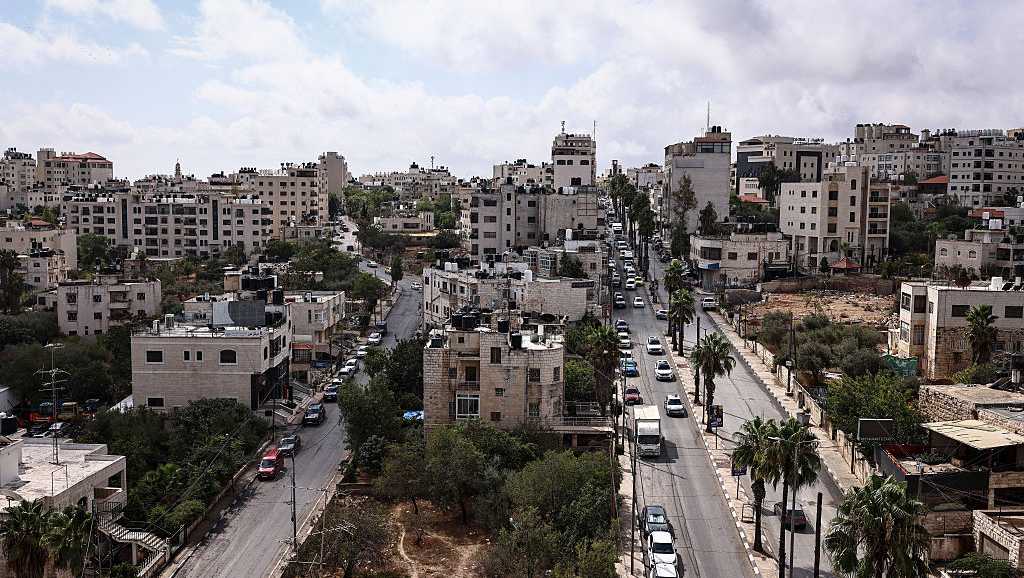Jewish and Palestinian communities in Greater Cincinnati are closely watching the latest developments in the ceasefire agreement between Israel and Hamas.For many with loved ones caught in the crossfire thousands of miles away, the agreement brings a sense of cautious optimism. Outside the Jewish Federation of Cincinnati, signs reading “Bring Them Home” echo the message written across hung T-shirts inside the facility, honoring Israeli hostages still in captivity.”In this, there are elements of joy and there are also moments of grief,” said Danielle Minson, CEO of the Jewish Federation of Cincinnati. “I’m hoping to see all the hostages returned. Hopefully, there are 20 living hostages and hopefully they are returned whole.” The ceasefire agreement calls for the release of both living and deceased Israeli hostages in exchange for Palestinian prisoners.Minson expressed uncertainty over how long the agreement will hold. “This is a really delicate situation. Stakes are really high and things could break down at any moment,” she said. “That’s why we just hope that we actually do have peace this time.” The emotional toll of the ongoing conflict, now entering its second year, is being felt on both sides of the local community.Ameer Alkayali, president of the University of Cincinnati’s Students for Justice in Palestine, called this a moment of cautious celebration.”This is a moment of strength. This is a moment to rejoice and we are trying to share that joy with them and understand the deeper context of what’s going on,” Alkayali said. Alkayali recognizes the progress to end the war but said the devastation in Gaza remains overwhelming for Palestinians who are displaced and left with destruction.”Hope is in the nature of Palestinian culture,” he said. “We’d like to stay hopeful, but have to be grounded in reality.” President Donald Trump is expected to visit Israel on Monday. U.S. military officials say plans are in place to potentially deploy about 200 troops to help stabilize Gaza and provide humanitarian aid.
Jewish and Palestinian communities in Greater Cincinnati are closely watching the latest developments in the ceasefire agreement between Israel and Hamas.
For many with loved ones caught in the crossfire thousands of miles away, the agreement brings a sense of cautious optimism.
Outside the Jewish Federation of Cincinnati, signs reading “Bring Them Home” echo the message written across hung T-shirts inside the facility, honoring Israeli hostages still in captivity.
“In this, there are elements of joy and there are also moments of grief,” said Danielle Minson, CEO of the Jewish Federation of Cincinnati. “I’m hoping to see all the hostages returned. Hopefully, there are 20 living hostages and hopefully they are returned whole.”
The ceasefire agreement calls for the release of both living and deceased Israeli hostages in exchange for Palestinian prisoners.
Minson expressed uncertainty over how long the agreement will hold.
“This is a really delicate situation. Stakes are really high and things could break down at any moment,” she said. “That’s why we just hope that we actually do have peace this time.”
The emotional toll of the ongoing conflict, now entering its second year, is being felt on both sides of the local community.
Ameer Alkayali, president of the University of Cincinnati’s Students for Justice in Palestine, called this a moment of cautious celebration.
“This is a moment of strength. This is a moment to rejoice and we are trying to share that joy with them and understand the deeper context of what’s going on,” Alkayali said.
Alkayali recognizes the progress to end the war but said the devastation in Gaza remains overwhelming for Palestinians who are displaced and left with destruction.
“Hope is in the nature of Palestinian culture,” he said. “We’d like to stay hopeful, but have to be grounded in reality.”
President Donald Trump is expected to visit Israel on Monday. U.S. military officials say plans are in place to potentially deploy about 200 troops to help stabilize Gaza and provide humanitarian aid.
